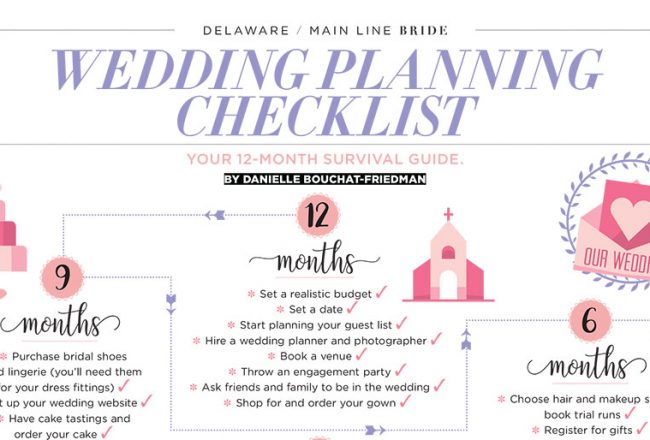Your guide to permits, licenses and legal documents.
by Pam George
A wedding day is a joyous occasion. You’re announcing to your family and friends—as well as to each other—that you’re joining your lives. In all likelihood, you’re also linking your bank accounts, credit cards and even your name.
To be sure, marriage is a legal arrangement with all the paperwork—and occasional headaches—that come with it. From procuring your marriage license to changing your name on your driver’s license, here are some legal steps to consider before and after the ceremony.
1. Get the necessary permits.
If you’re having an outdoor wedding, call the municipality to see if a permit is necessary. The cities of Lewes and Rehoboth Beach have beach wedding permit applications online. City, state and national parks often require special-use permits. Valley Forge National Park demands a nonrefundable $75 processing fee with its application. The venue may insist that you get event insurance. Because this takes time, plan ahead.
2. Secure the marriage license.
Each county has a set of requirements and procedures. Remember that you must get the license in the state in which you will be married. So if you live in Chester County, Pa., and plan to wed in Bethany Beach, Del., it’s best to follow the rules in Sussex County, where Bethany is located.
Depending on the county, you may need to apply in person. In New Castle County, Del., however, you can apply online for a marriage license. Even if you do apply online, most counties want the couple to pick up the license in person.
Check the websites for the requirements before you go. You’ll likely need valid identification, such as a passport or state driver’s license. If you’ve been married before, bring proof of the divorce, annulment, dissolution or the previous spouse’s death. (Some counties, including Delaware County, stipulate that you must wait 30 days after the court grants a divorce decree before applying for a license to marry someone else.)
A marriage license is only good for a set amount of time. In New Castle County, it’s valid for 30 days. In Delaware County, it’s valid for 60 days. You’ll also need to wait a specified amount of time—usually 24 hours—from the moment you obtain the license to when you can use it. If you don’t live in the state where you are getting married, you may need to wait longer. Leave yourself plenty of time.
There is a fee for a marriage license, which differs from county to county. In Chester County, for instance, it’s $75. In New Castle County, it ranges from $50 to $100, depending on if at least one person is a Delaware resident. Some, including Montgomery County, only take cash. Others, including Delaware County, take credit and debit cards. To be safe, review the requirements and tap an ATM just in case.
3. Make sure the officiator is authorized.
For the most part, qualified officiators include a judge, mayor or a minister, rabbi or priest of any established church or congregation. If the county or state does not recognize the officiator, you won’t be legally married. New Castle County offers a list of suspended officiators. But in most counties, it’s on you to make sure the officiator is in good standing.
4. Change your name on your Social Security card and driver’s license.
Once you’re married, you and your spouse may elect to share the same last name. To make it easier, consider a service such as NameChangeProcess.com, which is endorsed by New Castle County’s clerk of the peace. MissNowMrs.com and hitchswitch.com are other online services.
Whether you use a service or not, you’ll need to start by ordering several official copies of your marriage certificate with a raised seal. Most agencies will not accept photocopies. Take a copy and your ID to the local Social Security office; you’ll need a new card for all the subsequent changes. (You keep the same number.)
Think carefully about your name and how you want it to appear. Amy Watson Bish, a Wilmington resident, made her preferred changes on her Social Security card but the DMV insisted on a hyphen between Watson and Bish when she told the staff that she wanted to keep her middle name, which is Lane. “I’m hyphenated on some things and not on others,” she says.
Carol Arnott Robbins, also of Wilmington, was also told to hyphenate her name. “My passport and Social Security card are not hyphenated but the DMV did it anyway, even though I told them my legal last name is Arnott Robbins with no hyphen,” she says.
The Department of Motor Vehicle or Pennsylvania’s Department of Transportation will also require paperwork regarding any of the previous names that you’ve used, such as the surname of a now ex-spouse. Robin Glanden of Newark, who’s been divorced, had everything she needed but ran into issues thanks to the stage name she used for 26 years with the actor’s union. She lacked legal documentation for that name. “Finally a really nice supervisor helped me,” she recalls. After completing a pile of documentation, she got her license.
At the DMV in Delaware or the Pennsylvania Drivers License Center, ask about updating your voter’s registration or car title.
If you have a passport, put that item next on your to-do list, particularly if you plan to travel abroad in the coming year. You’ll need to apply for a new passport, and the processing time and cost will depend on how long it’s been since your current passport was issued.
5. Focus on financials.
With your new IDs in hand—and possibly your marriage certificate—you’ll need to inform your company’s human resources department about your name change. Next, comes your bank and broker. To make it easy, visit your local branch in person. There might be a fee for new checks or a new debit card. Change your credit cards, or close those accounts and open new ones.
Consult your mortgage company if you need to change your name on that account. If you have a lease, talk to the landlord. Seek legal advice about changing a deed or will.
6. Make a checklist.
Talk to the post office about your name change, so you will receive mail with your new name. As bills and magazines with your old name come through the mail or e-invoices arrive in your inbox, you can address the next areas that need a change.
Here’s a list to help you keep track:
◊ Utilities
◊ Cable, Internet service and cell phone
◊ School loans or any other loans
◊ Subscriptions both online and via snail mail
◊ Medical records and health insurance
◊ The IRS
◊ Memberships, such as the gym or professional organizations
◊ Clubs
◊ Library cards
◊ Airline and other loyalty programs
◊ Social networks
In an informal survey on Facebook, changing a PayPal account proved more frustrating than getting a new driver’s license. One respondent gave up and canceled the account and then opened a new one.
Indeed, one solution is to simply keep your name. The choice is happily up to you and your spouse.





No Comment